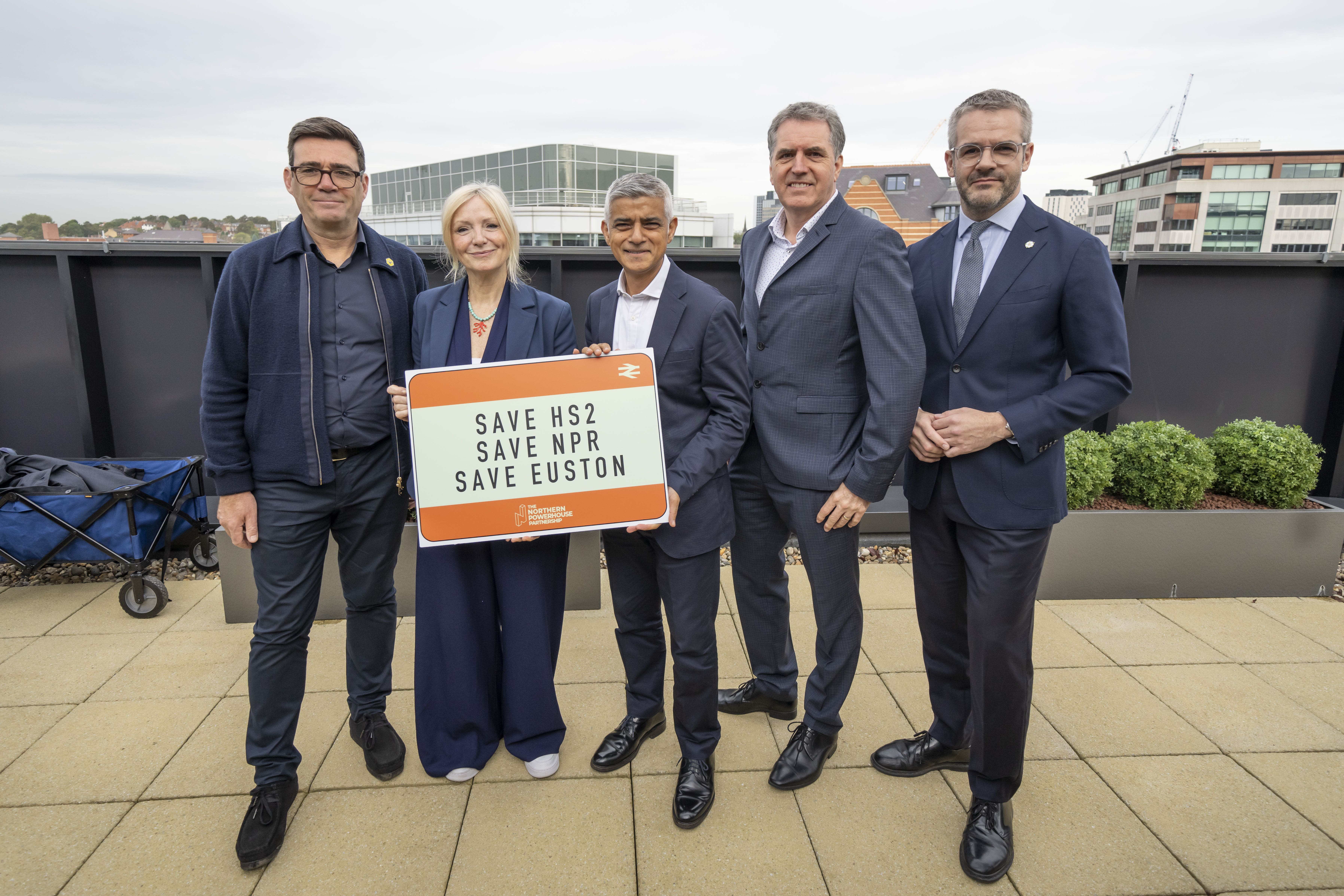How The Independent forced the PM’s hand on HS2
Had this paper not revealed Rishi Sunak’s plan to scrap the northern leg of the line, he might still be touting levelling up as a top priority. It’s not a claim anyone will take seriously now, writes Andrew Grice


Today’s call by five Labour mayors, including Sadiq Khan and Andy Burnham, for HS2 to go ahead, will pile more pressure on Rishi Sunak to rethink his plan to delay or scrap the project’s northern leg from Birmingham to Manchester.
The mayors, who met in Leeds today, called for the Northern Powerhouse Rail project to be delivered in full to ensure “not only north-south but west-east connectivity between Liverpool and Hull.” Their opposition to Sunak’s plan is not party political; it is shared by Andy Street, the Tory mayor of the West Midlands.
Sunak would be wise to listen to the mayors. When he eventually announces his decision on HS2, he will dress it up as a boost for transport services in the North. If his intention to dismantle the HS2 programme had not been revealed by The Independent, he might have persuaded some Northern voters that levelling up was still alive as a government priority. But not now: the die has been cast. Sunak will be unable to erase the damaging impression the Tories have failed to keep their promise to bridge the North-South divide that was crucial in winning over red wall voters in 2019.
Cancelling or delaying the Birmingham-Manchester leg would be a powerful symbol of that failure. Sunak will sugar the pill by announcing improved rail, bus, tram and road links in the North. But this much cheaper option would not erase the damage to levelling up that shelving HS2 would do.
Intriguingly, Burnham is willing to discuss a delay to the Birmingham-Manchester link if the government commits to an east-west route – a compromise several Tory MPs in the North would support. It could also be Sunak’s escape route from the mess he is in.
Some Tory MPs in the South hope that scrapping HS2’s northern leg would create more headroom for the tax cuts they crave. But the fiscal arithmetic might not be that simple, as much of the HS2 spending is scheduled for future years. Sunak’s manoeuvres could create a fiscal headache for Labour. Although the party is formally committed to HS2 in full, Keir Starmer’s actions in power would be heavily influenced by what the government does before the election.
Some Tories fear that cancelling the Birmingham-Manchester leg would hand Starmer a much-needed pot of money to spend on other priorities. But the Labour leadership is cautious. As one senior figure told me: “The problem is that the moment it [HS2] is curtailed, we have to find a way of funding it if we want to keep it going. So what alternative spending would be axed to pay for it?”
While Sunak’s anxiety about the ever-rising cost of HS2 is real, he might also be attracted by the idea of laying such a trap for Labour. It wouldn’t be the only one before the election. Labour’s suspicions will be fuelled by the revelation in The Times today that Sunak is being advised on HS2 by Andrew Gilligan, a former Johnson aide who failed to persuade the former PM that HS2 was “the greatest infrastructure mistake in half a century.” The Blair government went to war with Gilligan when, as a BBC journalist, he claimed a dossier about Iraq’s weapons of mass destruction was sexed up by Downing Street. He later resigned from the BBC, along with its chair and director general.
Sunak’s own headache on HS2 is part of a pattern. The launch of his reset by diluting some net zero measures was also delivered firmly on the back foot after his intentions again leaked out – on this occasion, to the BBC.
His decision to rewrite the government’s HS2 and net zero plans have something else in common – they were the work of Johnson. This is the start of operation distance as Sunak tries to convince the public he is different from his Tory predecessors.
Sunak’s pitch – that he is tackling the long-term challenges his Tory and Labour predecessors ducked – is attractive at first glance, but not on closer scrutiny. Dismantling the means to hit net zero by 2050 and ensuring 21st century rather than Victorian transport infrastructure are critical long-term tests for the country. Yet Sunak’s decisions on both will make it harder for them to be passed.
His chosen ground is highly selective. He, too, is ducking two of the biggest challenges: reforming planning laws to deliver the housebuilding the country desperately needs and ending the crisis in social care which compounds the NHS’s already huge problems.
I suspect many voters will conclude that Sunak’s focus on long-term challenges is more about trying to improve his dire short-term electoral prospects.






Join our commenting forum
Join thought-provoking conversations, follow other Independent readers and see their replies
0Comments